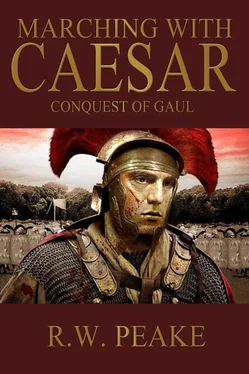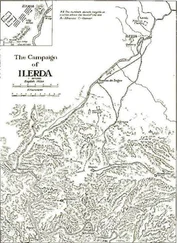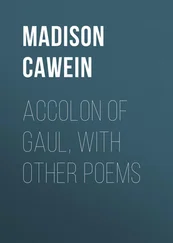R. Peake - Marching With Caesar - Conquest of Gaul
Здесь есть возможность читать онлайн «R. Peake - Marching With Caesar - Conquest of Gaul» весь текст электронной книги совершенно бесплатно (целиком полную версию без сокращений). В некоторых случаях можно слушать аудио, скачать через торрент в формате fb2 и присутствует краткое содержание. Жанр: Исторические приключения, на английском языке. Описание произведения, (предисловие) а так же отзывы посетителей доступны на портале библиотеки ЛибКат.
- Название:Marching With Caesar: Conquest of Gaul
- Автор:
- Жанр:
- Год:неизвестен
- ISBN:нет данных
- Рейтинг книги:3 / 5. Голосов: 1
-
Избранное:Добавить в избранное
- Отзывы:
-
Ваша оценка:
- 60
- 1
- 2
- 3
- 4
- 5
Marching With Caesar: Conquest of Gaul: краткое содержание, описание и аннотация
Предлагаем к чтению аннотацию, описание, краткое содержание или предисловие (зависит от того, что написал сам автор книги «Marching With Caesar: Conquest of Gaul»). Если вы не нашли необходимую информацию о книге — напишите в комментариях, мы постараемся отыскать её.
Marching With Caesar: Conquest of Gaul — читать онлайн бесплатно полную книгу (весь текст) целиком
Ниже представлен текст книги, разбитый по страницам. Система сохранения места последней прочитанной страницы, позволяет с удобством читать онлайн бесплатно книгу «Marching With Caesar: Conquest of Gaul», без необходимости каждый раз заново искать на чём Вы остановились. Поставьте закладку, и сможете в любой момент перейти на страницу, на которой закончили чтение.
Интервал:
Закладка:
Making matters worse were the Veneti themselves, in the way that they situated their defenses. Constructing a series of forts to protect their harbors and the towns surrounding them, they placed them in such a way that, despite our best attempts, we could not carry them and thereby gain entrance to the towns. The forts were not much to look at; it would take only scaling ladders and a few of our artillery for us to get over the wall to subdue the men inside, but it was where they were built that was the problem. The Veneti would find a spit of land that projected into the water, of which there were countless inlets, coves, estuaries and such in that region to choose from, where it was only accessible during low tide. At high tide the finger of land that connected the fort to the mainland would disappear, and we tried a number of different ways to deal with this. Finally settling on a method, Caesar simply had us throw a foundation of stone dragged from nearby quarries and the like, followed by enough dirt to the point that a mole was built that we could march out on to assault the fort, but this would be where the second advantage of the fort would become apparent, with the garrison simply boarding the Veneti ships and sailing away to the next position. It was in this manner that we began subduing the Veneti, except it was incredibly time consuming, and in our view, tiring and frustrating. Each day would see us caked in mud and filth from the tidal pools, mud flats and marshes that served as our source of raw materials, with not even the most vigorous scrubbing completely removing the stench of salt and decay that oozes from the ground in that part of the world. Very quickly we developed a healthy hatred for this region, and for the Veneti, who continued their tactics of delay, moving from one fort to another. I do not think we killed a hundred men during those weeks, merely playing a kind of a game of chase, moving from one inlet to another. Tempers grew short around the fire as the summer passed, a summer that was the least profitable in every sense since we started campaigning in Gaul.
“No battle, no booty, no women, nothing but this cursed mud and trying to fill in the ocean,” griped Vellusius one night, somewhat surprising me since he was not the sort to make comments like this, but it told me that the mood was getting grim.
Vellusius was only saying what the rest of them are thinking, I told myself, while yet again I was confronted by the paradox of command, because essentially I agreed with them. I could not say it, however, because it was my job to keep this kind of talk confined to the interior of our tent or around our fire, as long as it was not too loud or too sharp. All soldiers complain; we consider it a right given to us by both Mars and Bellona, although I have heard some soldiers laughingly suggest that the right to carp and complain has to come from the female god of war and not the male. In that moment, I could see the heads nodding at Vellusius’ comment, so automatically I looked at Vibius, waiting for him to speak, but I was surprised because he said nothing, instead contenting himself with looking vacantly at the fire while gnawing a piece of bread, spitting out the kernels of grain that had escaped being ground down. By this time we had just “taken” our fifth fort, if by taking one means that we occupied its vacant space once the Veneti had embarked on their ships, and all we knew at the time was that the orders were to march the next morning.
Apparently Caesar had endured enough of what we were doing also, for which we were thankful, because our general decided to wait on the fleet that Brutus was building, where we would then take the battle to the sea. This meant only one thing for us in the ranks; we would be sitting this fight out, which after the frustrating and futile effort we had been putting forth, was fine with us. We were marched to a spot overlooking a bay that would serve as the marshaling point for the fleet, awaiting the arrival of Brutus and his ships, making a camp on that spot. It was a matter of a few days before the word was shouted that ships were sighted; as usual Caesar had chosen his ground well, our camp being situated on a point much higher than the bay below us, giving us a perfect view of not only the bay but the immediately surrounding area. It was into the bay that our fleet sailed, and I stopped counting at a hundred ships of varying sizes. I was not a sailor, nor did I have any knowledge of nautical affairs, but I was hard pressed to see how any fleet of Gallic ships could stand up to the onslaught facing them. My opinion immediately changed when, standing with all of my friends on the ramparts of our camp to watch the show, we saw the Veneti fleet come into view.
“By the gods, they’re huge,” gasped Calienus, and coming from the normally imperturbable Tesseraurius, this alone was enough to make us worry.
The Gallic fleet was not just huge in the size of their ships, dwarfing our triremes as if they were rowboats, there were substantially more of them than was contained in the fleet Brutus was leading.
“You know what this means,” Atilius said glumly. “We’re back in that cursed swamp, filling in the ocean just to chase these bastards off.”
This was our frame of mind as we watched, expecting defeat, instead witnessing a miracle.
It was a miracle only in the sense that once again, our praefectifabrorum showed their true genius. Unable to ram the larger ships since the timbers of ours were not built to withstand the rougher water of the open ocean, our engineers contrived a way to rob the Gallic ships of their most precious asset, mobility. Unlike our ships, which used both a sail and oars, the Gallic craft were powered by sails alone, so the engineers created an implement that was little more than a long pole with an iron hook on it. Although the Gallic ships were bigger and stronger, they were also slower, especially when the wind was not in their favor, thereby allowing our oar-driven vessels to maneuver alongside. Once in position men on deck, holding the pole, would grab at the wooden horizontal crossbeam that held the sail in place, then while they were holding tight, the captain of the Roman ship would give the order to begin pulling away. The strain was such that the ropes holding the wooden cross-piece would snap, and before our very eyes, the sails on the Gallic ships began to tumble down, each craft slowing to a stop to lie dead in the water.
“That’s not good,” commented Calienus dryly, “if you’re a Veneti at least.”
We laughed at this, and in delight we watched as one by one the Gallic craft were immobilized, whereupon they were swarmed by the smaller Roman ships, the men on our vessels then clambering over the side. From our vantage point, we could not see the action on the decks because it was too far away, and were barely able to make out the figures of our men climbing up the side of the Gallic ships, but it was clear enough what was happening. One by one, the Gallic vessels were overcome in this way, until it became clear to those Veneti who were left that their cause was hopeless, whereupon they turned to flee out to the open water. That is when the gods intervened, once again showing the Romans their favor, as the wind, a stiff breeze that had been blowing the whole day, suddenly stopped for no reason. While the Gallic ships were just beginning to pull away into the distance to the point where we could no longer tell what was happening, we could at least see that suddenly our own craft caught up to them, and the remaining Gallic ships were quickly subdued. Just before dark, the wind freshened, enabling some of the Veneti craft to slip away, but the vast majority of them were taken, with the damage done. Before the day was out, the Veneti had been conquered.
As an example to the other tribes in the region, Caesar had the entire Veneti council of elders put to death. During the time we were slogging away in the marshes to the south, Sabinus and his Legions had been busy as well. The tribes that threw their lot in with the Veneti; the Lexovii, Aulerci and Eburovices, led by a man named Viridorix, were the tribes that Sabinus was sent to chastise. And chastise them he did, indeed. Using a stratagem of guile by appearing to be weak, Sabinus induced Viridorix to attack a fortified Roman camp with a mile of clear ground around it. When we heard the circumstances of the Sabinus victory, we had a good laugh at that, knowing that it was the height of folly for a Gallic tribe of any kind, having such disdain for the science of siegework as they did, to attempt an assault of a Roman camp. The battle was more of a slaughter than anything, prompting the confederation of those three tribes to immediately fall apart with our victory, so that three more tribes of Gaul found themselves at the mercy of Rome. It made one wonder when they would learn; at least that is how I looked at it.
Читать дальшеИнтервал:
Закладка:
Похожие книги на «Marching With Caesar: Conquest of Gaul»
Представляем Вашему вниманию похожие книги на «Marching With Caesar: Conquest of Gaul» списком для выбора. Мы отобрали схожую по названию и смыслу литературу в надежде предоставить читателям больше вариантов отыскать новые, интересные, ещё непрочитанные произведения.
Обсуждение, отзывы о книге «Marching With Caesar: Conquest of Gaul» и просто собственные мнения читателей. Оставьте ваши комментарии, напишите, что Вы думаете о произведении, его смысле или главных героях. Укажите что конкретно понравилось, а что нет, и почему Вы так считаете.












